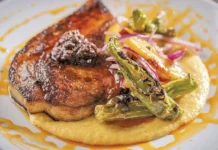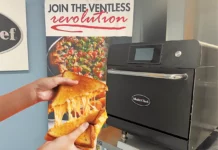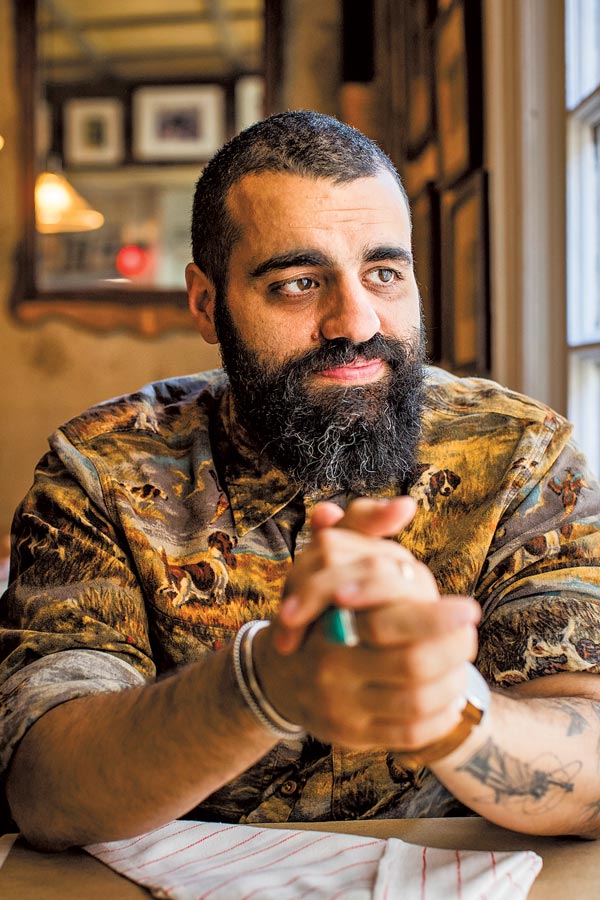
Restaurateur and Founder/CEO, Happy Cooking Hospitality
Gabriel Stulman has been instrumental in redefining the concept of a neighborhood restaurant. With the growth of his New York City footprint, many look at him as the Mayor of the West Village.
Stulman first developed his passion for the hospitality industry while attending the University of Wisconsin- Madison and working in local restaurants. In 2009, after several years spent working in celebrated restaurants in New York, Gabriel and his wife Gina opened Joseph Leonard in the West Village, which became the foundation of their powerhouse restaurant group, Happy Cooking Hospitality. In the years since, Happy Cooking added five more West Village restaurants to the family: Jeffrey’s Grocery, Fedora, bar Sardine, Fairfax, and The Jones.
In 2018, Gabriel Stulman officially extended his empire to Manhattan’s Flatiron district with two new restaurants and a bar in the Freehand New York hotel: Studio, Simon & The Whale, and George Washington Bar. Gabriel has been featured in Crain’s New York Business “40 Under 40” and was named the 2012 “Restaurateur of the Year” by Esquire magazine.
Total Food Service wanted to get Gabriel’s thoughts on how he built his empire and how he has navigated through the pandemic to build his vision for the future.
What spurred your interest in cooking in the culinary world?
Well, I think it’s important for you to know I’m not a chef. So, I don’t want to be misleading anyone. I loom in the business with a front of the house perspective.
What did get you interested in the restaurant business then?
Like a lot of people before me and many students after, I found my way into a restaurant, as a first necessity. I was attending the University of Wisconsin Madison, and as a student, you need money and you need a night job. If you’re 18 years old, there are not a lot of nice employment opportunities, so restaurants are a great fit. But beyond income, I found that it brought me a sense of community. I made very dear friends with the people that I worked with at the restaurant. From there, I became a part of a larger restaurant community that evolved where I befriended cooks, waiters and bartenders from other places. The bartenders that worked down the street would visit our place on their day off, and then on my day off, I’d go see them. Same thing with the chef from around the
corner.
That turned into a second layer of community that I became a part of and brought me even more friends. My path was a little different in that I didn’t work at a typical college bar. I worked at a place with a more adult crowd and it was a little bit more where the professors hung out. But I fell in love with hospitality and realized that it was in fact a profession.
I found myself to be drawn to learning about food, ingredients and wine that took me far beyond the kosher home that I grew up in Virginia. I was having fun and making money and was truly inspired. It dawned on me that I could really enjoy doing this for a living.
Were there mentors that you took away from your experience in Madison?
No, because I think a mentor is too strong of a word. To me, a mentor is reserved for somebody who I spent a lot of time with, took me under their wing and taught me things. I have worked at many places and while I have learned and taken things from those experiences, I don’t think I’ve ever had a mentor in my life. But keep in mind that I was 24 when I went off on my own. By the time we opened The Little Owl, I was 25.
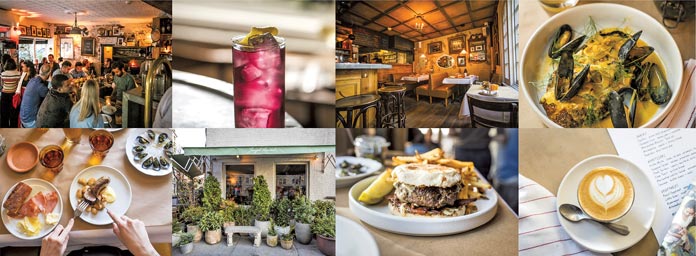
When did you launch your entrepreneurial career?
I was 11 years old when I turned my backpack, in junior high, into a vending machine. My goal was to undercut the pricing in my school’s vending machine. Before too long, I had turned my locker into a larger version of a vending machine. I would have my parents take me to Sam’s Club to buy Snickers, Butterfingers, Kit Kats and Roll-Ups in bulk. Then I sold everything for 25 cents less than the vending machine and understood early on about making a profit.
I also grew up in a home with very encouraging parents. Along with my brother and sister, there were a lot of mandatory chores, and there was an allowance that you would earn. If you didn’t fulfill all of your chores, your allowance would be deducted proportionately based upon what chore you didn’t complete. They taught us that if we wanted things in life, we needed to earn the money to buy them. So if it wasn’t Hanukkah, I wasn’t getting it unless I bought it.
My parents would encourage me to sell candy, mow lawns, rake leaves or shovel driveways, so that I could make money to go buy the things that I wanted to buy. That mentality grew from wanting a Nintendo game to being a 23 year old wanting to backpack in Europe, and to go to South America.
What led to the opening of the Little Owl at age 25?
I moved to New York City and was working at a restaurant called Pace. It was in Tribeca and lasted for a year. It was the fourth or fifth restaurant collaboration for business partners Jimmy Bradley and Danny Abrams. They had the Red Cat, The Harrison and Mermaid Inn and Pace where I was a bartender.
When Pace went out of business, I ran a supper club out of my apartment in the Lower East Side. I befriended the chef from Pace, and called him for connections to buy wholesale ingredients. Finally, he wanted to know why I needed massive quantities of fish or soft-shell crab. We decided that rather than him going to cook for someone else and me bartending elsewhere that we should join forces and open our own place.
I was living on the Lower East Side and rode my bicycle by a place that said store for rent by owner. I was young, naive, ambitious and bold. We found a place that was a restaurant previously with a kitchen. We signed a lease and then found out after we signed the lease that we’d never have a full liquor license because it’s across the street from the school. We didn’t realize that, so we ended up just being able to offer beer and wine. I said f–k it, we’ll roll with that. It was all of 600 square feet and we did what I would call a frugal Ikea build-out. Forget pewter or marble, we did it with plywood and hand-me-downs.
What did you learn from that first experience?
I learned early on the difference between a neighborhood restaurant and a restaurant in a neighborhood. It started with the lesson learned with taking reservations on all of the seats. What appeared to be very exciting about being booked a month in advance means that you’ll never be a neighborhood restaurant. Because the person who lives across the street from your restaurant isn’t going to make the decision to eat at your place three weeks from now. They want to come off their elevator and roll in or stop on the way home from work. For instance, Le Bernardin is in a neighborhood but not a neighborhood restaurant.
I was super grateful and loved all the success and how busy we were and being booked a month out in advance, it’s really exhilarating for your first restaurant. But I realized what I really wanted was what I learned in Wisconsin and I wanted to be more immersed in the neighborhood. I wanted to have regulars that just popped in all the time for in breakfast, lunch or dinner. I learned the only way to achieve that is to not take reservations on every table. I wanted the kind of place that I wanted to go to. Where I can just walk in off the street. I want somebody to make room for me at the bar, because I come all the time. Think of it as a place I can hang out, that’s casual enough that it doesn’t require making plans.
Put your entrepreneur hat back on. Which model is more lucrative?
You can make money either way. It’s not the policy that makes you financially successful. It is your execution and how people relate and like what you’re doing. You need to decide who you are because you need to live it every day.
What was your experience with having a partner?
I learned that I’ll never be a 50/50 business partner. I was 24 at the time. It’s not to say that partnership cannot succeed. Look at Jean Georges (Vongerichten) and Phil Suarez, Mario Carbone and Rich Torrisi, or Andrew Carmellini with Josh Pickard and Luke Ostrom. They have all had long successful runs.
What was the key to growing Little Owl into the amazing portfolio of businesses that you have built?
It started with closing the chapter on the partnership with Joe. We parted as friends and it gave me the opportunity to start over on my own. Look, none of us really ever does anything by ourselves. But you do get to call the shots. I restarted with Joseph Leonard and we’ve never looked back. The key has been to combine insane ambition, intense work ethic and creating a team of the very best talent under one roof.
For all intent and purpose, we built the culinary equivalent of two Chicago Bulls 1993 squads in one restaurant. At one point, we had three executive chefs working as line cooks and three directors of operations serving lunch as waiters.
Was the thought as you built these teams that you would open a new restaurant opportunity to accommodate them?
Never! It has always been about making this a f—–g great restaurant. Fast forward and a year later, I saw a place across the street with a sign in the window after a bad storm. It’s funny, the location was a couple stores down from where we would send customers to have a drink when they were waiting for a table at our place. So, it made sense for us to grab that opportunity.
But guess what, we already knew who’s going to be the Executive Chef: the guy who’s the sous chef right now. I know who’s going to be the GM: our head bartender. With the team we had built, I had a line cook who was ready to go step up to sous chef and a bartender who’s ready to step up and be the next head bartender.
I took my lead dishwasher who’s been amazing and moved him across the street as a prep cook. In baseball terms, we basically had our farm system.
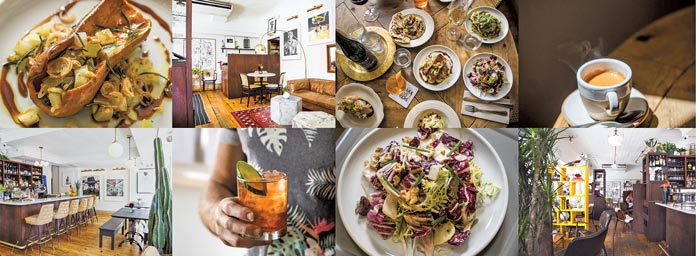
What is the thought behind multiple properties in the same neighborhood?
It made it really easy to grow with all of this talent working in our restaurants in the same neighborhood. We knew as new opportunities presented themselves in our neighborhood that we had the talent ready to go. If we didn’t have the talent, I probably would have said no to more things. From a management standpoint, it’s a dream. If we had problem at Joseph Leonard or something broken at Jeffrey, I could easily walk over to help get it fixed. I can bounce around and literally go say hello to guests at all three restaurants within 30 minutes. Smile, connect and get back to the first one before you’ve got your entrees.
How long did this neighborhood plan for expansion run?
Until about March 15th, 2020 when COVID-19 closed New York City. Guess what, it’s probably been a blessing in disguise. I think we’ve been on a treadmill cranked to maximum levels for a decade, and never really got off to evaluate or consider any of it.
Perspective and introspection, what gives?
I realized that more is not more. I want to spend more time with my family. I’ve got two young sons and the oldest one is eight. I sadly missed the first four years of his life while I was working, and the other one just turned two. For the last seven months, I’ve seen a lot of them. And I think my life is a lot richer because of it Whatever I gained from building another restaurant, I’ve gained way more from seeing them laugh and giggle and have a relationship with me.
Let’s be honest, it’s great to be an impactful restaurateur in New York City. But in the grand scheme of things, Des Moines has a restaurateur that’s important to them as well as San Francisco, LA and every other city. Bottom line, we all get too carried away with the importance of our businesses in the communities we serve at the expense of what’s really important. Once you get rid of ego, you realize that nobody gives a f–k how many Michelin stars you have or James Beard awards or New York Times stars.
The reality is that in 80 years, nobody’s going to talk about Keith McNally, Daniel Boulud, Jean Georges or Eric Ripert. If that’s the case, then what chance do I have? Because those guys are all a hundred times more successful than I am. What is going to last is my kids knowing me and loving me.
You are one of the few restaurant owners that have ever been asked to give a TED talk. Tell us about it.
The TED talk was about employee engagement and collaboration. It’s interesting, even with COVID, the points I made still ring true. I focused on how you make a culture that people want to stay a part of that and how do you appreciate your team. My perspective was that the less qualified internal candidate is a better choice than the more qualified external candidate. I explained how important it is that your work to create a culture that provides for internal promotion and with that comes loyalty. On top of that, intentional collaboration will make people voice their opinions more and contribute more. If you solicit their collaboration, it will make them feel valued.
Walk us through what that looks like at Happy Cooking Hospitality?
It starts with things like coming up with new cocktails and having the whole bar staff work on it. When you’re coming up with new dishes for the menu, you don’t just have the chef, you have the whole kitchen staff involved. Then when you get recognition, you share the credit. Every interview I’ve ever done: that was Brian’s cocktail, that was Matty’s dish. Share the spotlight.
Did you ever have a contingency plan in place before March?
(Sarcastically) Of course, everybody was prepared for a virus!
Seriously, the only comparable experience we had was a fire at one of our restaurants. We didn’t have a plan for the fire, and you deal with catastrophe. We have a daily closing checklist to make sure that you’re checking all the wires that are plugged in, that you have double-checked the pilot light. We looked at March as an expanded fire drill. We shut down all spending and contacted all vendors and landlords. Our goal was to immediately secure all liquid cash that we had. The next step was to call our lawyer to find out about all the labor laws, how to handle a catastrophe like this.
We needed the guidance to understand the procedures, you need to follow to avoid the WARN Act. This included, unemployment and health care benefits and how everything gets handled with a communication and strategy plan to disseminate info to our 300 people. Keep in mind, we let go everybody except for five people. It bugged me that we couldn’t pay people and I was determined to find a way we could make a difference. We had access to food, so my goal was to keep our people fed. We turned our restaurants into a food bank for our staff. Every week, we would set up a whole digital system, where emails, go out to all 300 former employees. Everybody could sign up, and you could tell us if you or your spouse or children had dietary restrictions. We were providing a week’s worth of groceries every Thursday to our entire company, and their dependents. We then expanded that program to feed first responders.
Can we get your thoughts on the role of outdoor dining and takeout and delivery for restaurants trying to survive?
I’m going to dissect them into two different topics. Outdoor dining is a restaurant’s right and that I think is great. Fortunately, the ‘City has relaxed its’ zoning laws and regulations and stringent ways to facilitate outdoor dining. I like it because with tables outside, you’re still greeting and serving people. It’s limited seating though so the potential for revenue has a ceiling.
Takeout and delivery is a totally different conversation. Can a restaurant sustain on it? Absolutely, some people are thriving with it. But I’m not interested in it because that’s not what I fell in love with. Look, this is going to sound arrogant, but generating revenue from delivery is not that difficult. That’s not what I give a s–t about.
I didn’t get into the restaurant industry to put food in boxes and have it go out the door on a bicycle. I got into the restaurant business because I like hearing glasses clinked together. I like the sound of laughter, I like smiling faces, I like the smell of food.
I like the pots and pans. I like strangers meeting at the bar and f—–g later that night. I like making a place where people celebrate birthdays and anniversaries and cry. I like camaraderie, I like the energy of a restaurant.
Delivery has no culture to me. If delivery is all there is, then I should stop. I could be so much wealthier going to work for Goldman Sachs where I’ll be rich. I don’t need to waste my time on delivery. I do restaurants, because it’s about so much more than food. It’s so much more than business. And so I’m not interested in figuring out how to make money during delivery and takeout. I’m not interested in it because I don’t want to run a delivery and takeout operation, if that’s what we are reduced to. I’ll go into real estate development instead.
Between this month’s election cycle and the role of government in the daily operation of restaurants, what are the lessons learned?
They have failed to support us because they’re incompetent and unintelligent. Harsh words but I think they’re actually appropriate. I don’t think they understand business and I think that they would like to think that they do. I think they think that they understand restaurants, and it is clear that they do not. I think that you cannot—as a country, as a state, as a city— on one hand tell us to close and then on the other hand say that we need to pay our rent.
They try to justify on half-assed explanations. You need to not look further than Canada. To find out how government can address this situation. My peers that own restaurants in Montreal, were protected by the government that stepped in and said the cap on rent was 25%, the government would pay the other 50% and the landlord was on the hook for 25%.What happened here is that the government let the PPP program get hijacked as rent subsidy. It stands for Payroll Protection Program which meant it was there to give me two and a half months’ worth of my average payroll not to pay rent.
The reality is that the government gave all of the money to the banks and told the banks to take 5% off the top. The bank’s 5% was essentially a $33 billion commission to move money from the government managed by Steve Mnuchin. So he gave all of his bank buddies cash. They took 330 billion, and then gave it to me and everyone else. We then took this money, and we were told to pay your landlord with it. My landlord has all of the rent that they lost. It means that they’re profitable because they don’t charge me less than their mortgage, they charge me more than their mortgage so now my landlords are made whole and makes a profit. On top of that, although there was a moratorium on eviction, the landlord could still terminate my lease.
Semantics because when he terminates my lease, now I owe him double the rent. Now you are threatening to sue me personally because I didn’t pay rent during a pandemic because the government couldn’t protect me. Deplorable!
The government tells us everything is great, to look at the stock market. But the stock markets are not a f—–g indicator of the economy. I used to have 300 employees; I have 100 now: that’s an indicator of the economy. The NASDAQ is up, please kiss my ass.
You’ve worked with the New York City Hospitality Alliance to trade groups that can advocate for the industry. Are they helpful?
They’re very helpful. Andrew (Rigie of the Alliance) is fantastic. God bless that guy. Yeah, they’re out there fighting tooth and nail for us.
What do you think it’s going to take to bring back the confidence of consumers and your team to make restaurants work again?
A great question and I think that the answer is super complicated. I think there’s plenty of people that are comfortable with it now. There’s a lot of people that are coming back and still there are a lot of people that are not comfortable with it as well. Many people are going to eat at a restaurant tonight, and some simply won’t comeback until there is a vaccine. We cannot make restaurants work at 25% indoor occupancy throughout the winter, when it’s 20 degrees outside. I don’t give a s–t how many heat lamps you have. I’m going to bring your chicken out and it will stay hot for three seconds, and then your chicken’s cold.
We need a minimum of 75% occupancy to have a chance at self-sustaining. Anything less than that will require financial stimulus. I believe that the first responsibility and priority we have as a business is to the greater society. We need to beat this virus, protect individuals’ health and save lives. And if that means reduced capacity — then that has my support — we just need our government to recognize that with reduced capacity for public safety we need financial grants.
I don’t want to hear about bailing out cruise ships or airlines. Our industry is far more important to the country. We need the Restaurant Act that had already been passed by the House to give the restaurant industry its’ first targeted bailout.
All images courtesy of Happy Cooking Hospitality
To learn more about Gabriel Stulman and Happy Cooking Hospitality, visit the website.


















